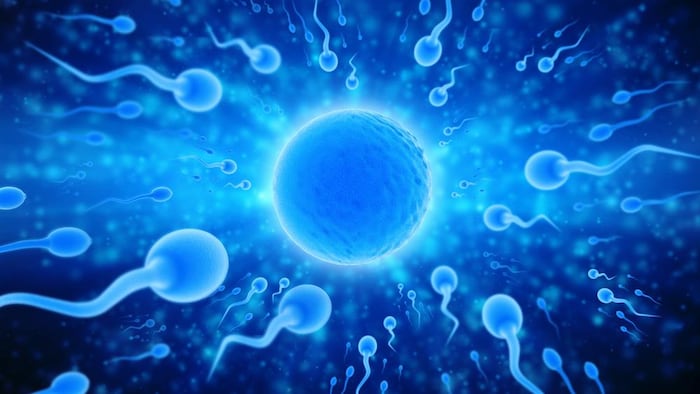Open full screen Male infertility is a widespread but treatable problem. Radio-Canada Feature being tested Log inCreate my account Speech synthesis, based on artificial intelligence, makes it possible to generate spoken text from written text. Once hidden, male infertility has been recognized for several decades as a widespread problem in our societies. During this Canadian Infertility Awareness Week which takes place from April 23 to 29, 2023, our archives remind us that medicine is increasingly successfully addressing this obstacle to obtaining offspring. A few years ago […], it was said that if a couple did not have children, it was the woman who was responsible. And if it was discovered that she was fertile, it was said that providence had not wanted this couple to have children. We now know that providence was very much man. A quote from Joël Le Bigot, 1977 At the beginning of April 2023, a study by the World Health Organization revealed that one in six people worldwide were affected by an episode of infertility during their lifetime. In 2022, international research confirmed a disturbing fact: the number of sperm produced by men decreased by a little more than half between 1973 and 2018. This decline has even accelerated since 2000. On April 18, 2021, an interview granted by biologist Daniel Cyr to the host of the radio show Les Années Lumière, Sophie-Andrée Blondin, explains that the Exposure to chemicals reduces the fertility of male fetuses during pregnancy. However, we must distinguish between infertility, which is a temporary state of procreation, and sterility, which is a permanent situation. Please note that these archive reports may contain information that is no longer up to date. Science-reality, March 4, 1977 In this report by host Joël Le Bigot on the showScience-réaliste
This problem among couples comes 40% from men, 40% from women, while 20% is of a mixed nature.< /p> It is the spermogram, the examination of the quantity and quality of seminal fluid, which will determine whether a man is infertile or not. Endocrinologist Jean Mailhot and gynecologist Diogene Cloutier, from the Laval University Hospital Center, tell us the many reasons that can make a man infertile . For example, varicocele — a dilation of the veins, the equivalent of varicose veins, in the scrotum and left testicle — would explain between 35% and 40% of male infertility. Obesity or smoking can also promote infertility. Heat, fatigue, sexually transmitted diseases are also enemies of male fertility. On the other hand, contrary to what many claim, the so-called mumps disease rarely causes infertility in men. In vitro fertilization, operational since the 1980s, contributes to the fight against couples' infertility. Among the available treatments that specifically address male infertility, we have found sperm microinjection developed by Belgian scientists since the early 1990s. Discovery, January 10, 2000 This technique, then quite recent, is the subject of a report by journalist Mario Masson and director Marièle Choquette presented on the show Découverte< /em> on January 10, 2000 hosted by Charles Tisseyre. It is thanks to this technique that Dominique Lacroix and André Clément gave birth to their daughter Laurence. Microinjection consists of isolating a single sperm, syringing it into an egg and thus forcing conception. In 2000, it was estimated that 20,000 babies were born using this process worldwide, including a few hundred in Canada. The pregnancy rate caused by this approach is close to the normal childbearing rate. At the beginning, says the report, these methods of fertilization aroused a certain fear among the population. Is it unnatural? Is it risky? Studies carried out in Belgium, Denmark and the United Kingdom at the time confirm that children born using this method do not have more physical or congenital malformations than those conceived in the traditional way. These results still seem valid in 2023. On the other hand, it was recognized that children born thanks to microinjection could in turn experience problems of infertility. This was particularly the case when the father's problem stemmed from a genetic deficiency. Scientists were also concerned as early as 2000 that the potential long-term effects of this method could not be studied. The microinjection technique, they noted, allowed the presence during fertilization of defective genetic elements which would not have had access to the egg under normal circumstances. Could this cause genetic diseases or also cancers in these children? Only research carried out on animals with rapid life cycles, such as mice or certain primates, could have helped to allay these concerns. There is still no definitive answer to these questions in 2023. Start of widget. Skip widget?End of widget. Return to start of widget?
Archive | For decades, medicine has studied and treated male infertility

